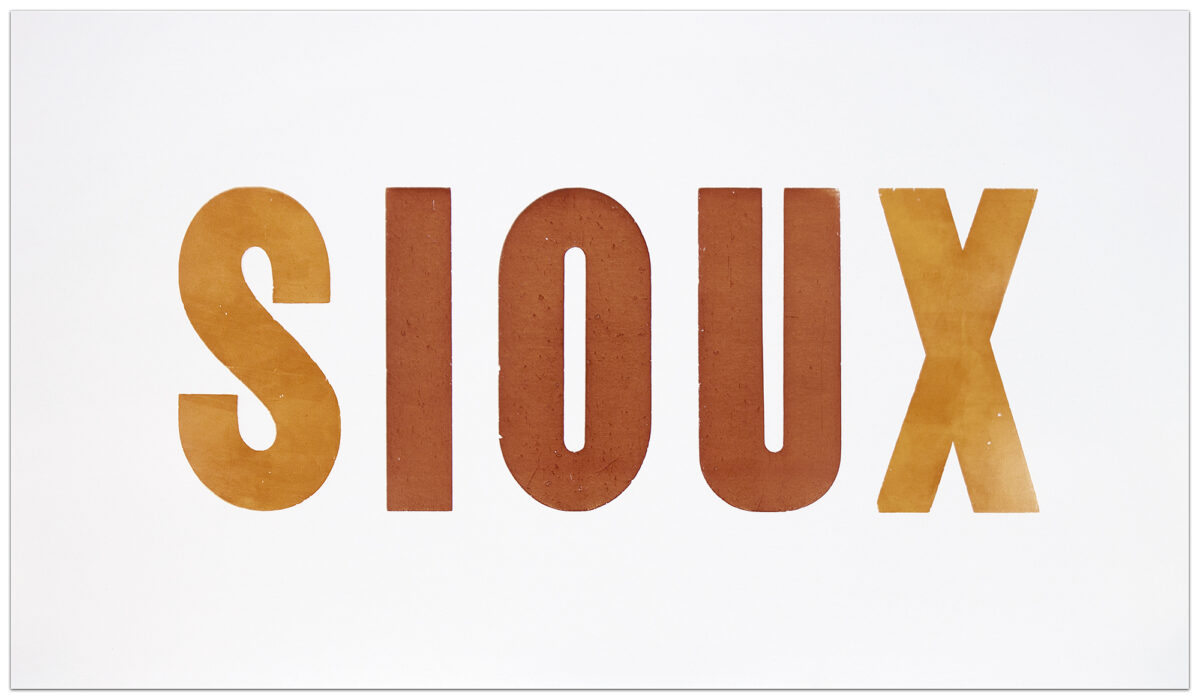
Edition of 20
Image/paper size: 25 x 44 inches (63.5 x 111.8 cm)
Signed, dated and numbered on reverse in graphite
(Inventory #28828)
Edition of 20
Image/paper size: 25 x 44 inches (63.5 x 111.8 cm)
Signed, dated and numbered on reverse in graphite
(Inventory #28828)
For anyone who has followed the attempts by the corporation, Energy Transfer Partners, to build the Dakota Access Pipeline less than one mile from the Standing Rock Sioux reservation, the message of the letterpress work “IOU” will be clear: both a promise and an apology to that tribe, and by extension, to the many other indigenous peoples whose rights and treaties have been trampled over the years. The land that is threatened was given to the Sioux tribe in the 1851 Laramie Treaty, although the government tried to reduce it later. The last leg of the pipeline route will pass under the Missouri River and threaten the reservation’s drinking water and the drinking water of millions of downstream residents, not to mention the pipeline’s contribution to global warming and its encroachment on sacred burial sites. This segment of the pipeline was originally supposed to be built at Bismark, but it was rerouted because it might threaten the drinking water of Bismark’s residents. As the protocol for approval of these pipelines, such as a thorough Environmental Impact Study, is radically altered by Trump’s orders, “IOU” fashions a simple message out of the heart of the Sioux tribe’s name. Luckily, as of July 6 of this year, a federal court ruled that all plans must be halted while the government conducts a full-fledged analysis examining the risk the pipeline poses to the Standing Rock Sioux Tribe.
Kay Rosen’s investigation into the visual possibilities of language has been her primary focus since 1968, when she traded in the academic study of languages for the study of language-based art. Through paintings, drawings, murals, prints, collages, and videos, Rosen has sought to generate new meaning from everyday words and phrases by substituting scale, color, materials, composition, graphic design, and typography for the printed page.
While political issues often form the bedrock of Rosen’s artwork, she insists that her work is driven not by politics, but by language, and she follows it to whatever place it takes her. Rosen loves the physical act of drawing and painting, and materially her paintings and drawings are intensively rendered; however, she considers language to be found material, conceptually placing her in the more passive role of a cognitive observer and enabler of language. The writer Rhonda Lieberman described her as a revealer of language who “shows it doing things that are totally above, beyond, and/or below its function as a mode of communication.”
Rosen’s work has been described as sculpture, poetry, architecture, and performance. Roberta Smith once called her a “writer’s sculptor” and Eileen Myles called her the “poet of the art world.” In a 2014 piece for Art In America, Rosen wrote: “The linguist in me wanted meaning to be carried by the structure of the words, not type style; the inner painter insisted that color convey meaning; the sculptor in me obsessed about the construction of letterforms through materials and process; and any poetic instincts strove for efficiency.”
Kay Rosen has been the subject of numerous articles, reviews, and group and solo exhibitions, including in 1998 a two-venue mid-career survey entitled Kay Rosen: Li[f]eli[k]e, curated by Connie Butler and Terry R. Myers at the Los Angeles Museum of Contemporary Art and Otis College of Art Design. She has been the recipient of awards that include a Guggenheim Foundation Fellowship in 2017 and three National Endowment for the Arts Visual Arts Grants. Her work is included in many institutional and private collections. Rosen taught at The School of the Art Institute of Chicago for twenty-four years. She was born and raised in Corpus Christi, Texas and lives in New York City and Gary, Indiana.
10 Newbury Street, Boston, Massachusetts 02116
617-262-4490 | info@krakowwitkingallery.com
The gallery is free and open to the public Tuesday – Saturday, 10am – 5:30pm